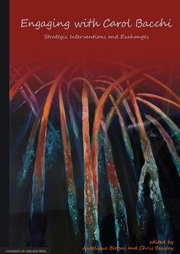Book contents
- Frontmatter
- Contents
- Acknowledgements
- List of Contributors
- Introduction
- Part I Looking back: On beginning
- Part II Strategic interventions and exchanges: Reflections and applications of the ‘What's the Problem Represented to be?’ approach
- Part III Strategic exchanges: The wider context
- Part IV Looking forward: Still engaged
Introduction
Published online by Cambridge University Press: 05 June 2013
- Frontmatter
- Contents
- Acknowledgements
- List of Contributors
- Introduction
- Part I Looking back: On beginning
- Part II Strategic interventions and exchanges: Reflections and applications of the ‘What's the Problem Represented to be?’ approach
- Part III Strategic exchanges: The wider context
- Part IV Looking forward: Still engaged
Summary
Carol Bacchi's scholarship is both substantial and wide-ranging. Beginning her academic career as a historian in the field of English-Canadian women's suffrage, Bacchi has made innovative and insightful contributions to the fields of feminist theory, critical policy studies, and post-structuralist theory. One of the characteristic traits of her scholarship is her interest in revising and revisiting analytic problems from a range of perspectives. To mention just one area in which this is so—the issue of gender difference—Bacchi has explored the use of ‘identity’ categories in (specifically) gender politics (1996); drawn attention to the way the construction of difference is enacted as a political attribution (2001) and, more recently with collaborator and friend Joan Eveline (2010), put forward the proposition that we ought to conceptualise gender as a verb: an activity or process, rather than as a noun. In each of these projects she has offered a new way to think the ‘problem’ of identity categories and ‘difference’ which long preoccupied, and, indeed, frustrated, feminist scholars. The persistence and imagination that is highlighted by this willingness to review and rework key analytical themes and issues is reflective of the tenacity and commitment Bacchi exhibits as a scholar and intellectual.
- Type
- Chapter
- Information
- Engaging with Carol BacchiStrategic Interventions and Exchanges, pp. 1 - 6Publisher: The University of Adelaide PressPrint publication year: 2012
- 3
- Cited by



